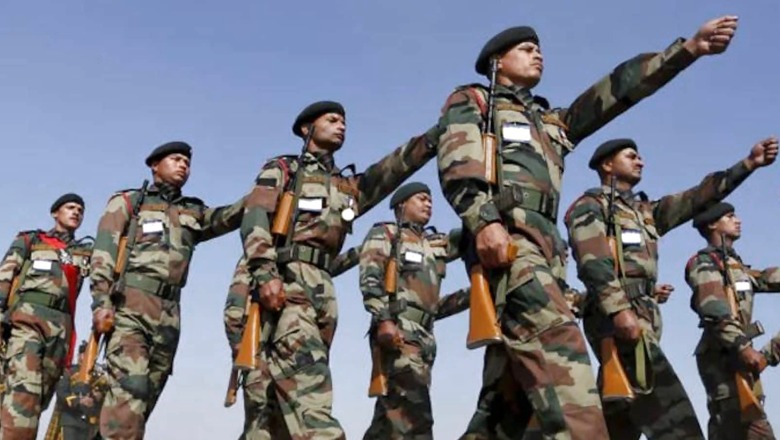
views
Armed forces of India are organised in a pyramidical structure resulting in very low promotion prospects, which also makes them extremely competitive unlike the Civil Services where promotions are assured up to a reasonably high rank. The fact that less than two per cent officers of a batch rise to a three-star rank in the armed forces reinforces the pyramidical nature of the organisation.
Selection to the rank of Colonel (equivalent) and above is extremely competitive having an average approval rate of less than 30 per cent and in some batches dipping to 20 per cent. Traditionally, officers of the Indian armed forces lead from the front and suffer disproportionately higher casualties during conflict which proves their levels of motivation and professionalism. Display of such leadership by the officers in combat happens only when they have faith in the system for their professional growth.
Aberrations in promotion process may exist but when viewed in totality, the existing system is very credible. However, all systems and procedures need to be periodically reviewed and upgraded in keeping with demands of the organisation and fast-changing environment, which the armed forces undertake. Issue of Seniority versus Merit has often come up for discussion in the context of promotions in the armed forces. There appears to be a misconception that promotions in the armed forces are tilted in favour of seniority. The reality is that seniority comes into play only when merit has been established through a credible and transparent selection process.
How the Promotion System Works
To discuss the issue of merit and seniority, it would be prudent to understand the system of career progression of officers in the armed forces. The current system ensures that all officers are promoted to the rank of time-scale colonel and equivalent based on their years of service. Selection-grade promotions are based on overall professional profile of the officer which includes their annual confidential reports, performance on courses of instruction, appointments held, performance in operational areas besides being in acceptable medical condition and having no adverse disciplinary remarks. Selection boards screen officers of a batch so that requisite number of officers is empanelled to fill the envisaged vacancies before they come up. It needs to be mentioned that the entire process of selection by the selection board is conducted in an institutionalised manner with no discretion.
There is an elaborate procedure for redressal of grievance in case an officer is not empanelled. It has been seen that genuine grievances of deserving officers get positively addressed post which they invariably get empanelled with their original seniority restored. It also must be understood that the system even takes care of the likely subjectivity which may come up due to the rating pattern of the reporting officers. To address such an issue, the Army Headquarters maintains a record of the rating pattern of the assessing officers (liberal or strict) which is brought to the notice of the selection board. Several such steps are taken to ensure justice and fair play which in turn ensures the system is objective and inspires confidence. Armed forces work on the premise that officers’ job is to work for the organisation without bothering for their annual reports and the system takes care of the rest. It works.
Merit-based Promotion a Norm
The issue of seniority within the batch up to the rank of major general and equivalent comes into play only to decide the sequence in which the officers are promoted and assigned appointments post empanelment. However, the seniority and residual service play a role in the postings of three-star officers. Appointments of all three-star rank officers and Chiefs of the three services are approved by the Appointments Committee of the Cabinet (ACC). To clear officers to the appointments of C-in-C (commander in chief) and Chiefs of the three services, the service headquarters propose a panel of officers who meet the laid down criteria to the ACC for approval. In order to provide a stable tenure in these key appointments, the criteria of residual service is applied while proposing the names. Normally, the senior-most officer is approved for the appointment unless there are strong inputs to change the order. It is entirely the prerogative of the ACC to appoint a person other than the senior-most, which is not a norm but an exception.
One reason which justifies seniority as the main criteria for appointments at higher level is the fact that by the time all these officers reach the three-star rank, they have already successfully faced four selection boards for promotion from Lt Colonel to Lt General which signifies continued consistency in their performance. At this stage, imposing an external agency to scrutinise the profile of senior officers to decide on comparative merit defies logic and will be unfair to the services and the affected officers who have built their profile putting in decades of hard work. In any case, the service headquarters, Ministry of Defence and the government are still vested with the authority to drop name of the person against whom there might be adverse inputs on the grounds of integrity, conduct or medical condition.
Merit-based promotion is a norm in the armed forces that must continue without imposing external agencies to tinker with merit at apex level, which may make the system vulnerable to manipulation. This may also give an opportunity to some service officers to sabotage the existing merit through external players or powers, which for sure will compromise the confidence in the system. Consistency in the policies and transparency in the processes are key to a vibrant apex-level human resource management system. Any compromise in this sphere can have serious ramifications for national security which must be avoided at all costs.
The author was head of Army Service Corps. He is a distinguished fellow at United Service Institution of India and a motivation and leadership speaker. The views expressed in this article are those of the author and do not represent the stand of this publication.
Read all the Latest News, Breaking News and Special: Live-updating IPL 2022 auction tally | IPL Mega Auction Live Updates here.




















Comments
0 comment